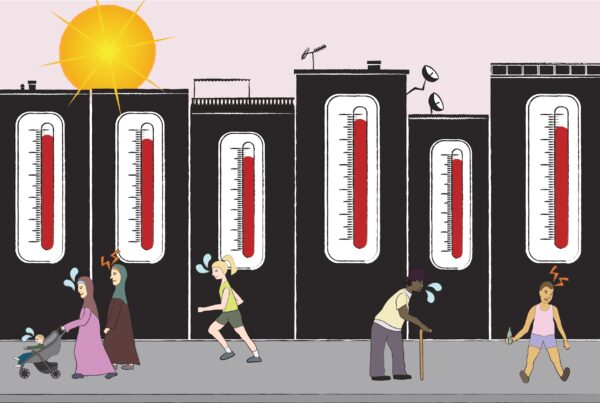By Robert Fletcher, Ivan Murray Mas, Macià Blázquez-Salom & Asunción Blanco-Romero
The COVID-19 crisis shows what degrowth in the global tourism industry could look like. But it would need much more concerted planning to address the social impacts of this transition.
From Overtourism to Undertourism
Just a few short months ago, popular media were filled with debate concerning “overtourism”: the presence of increasing numbers of tourists in popular destinations throughout the world, leading to conflict with and complaint by residents concerned that this influx was making their homes unlivable. Now, in an instant, everything has changed. The global tourism industry has ground to a halt, and consequently concern for overtourism has been replaced with newfound worry that “undertourism,” previously a marginal issue, will instead threaten the future of economies and societies worldwide.
The scale and implications of the current tourism slowdown are staggering. Depending on how one defines it, tourism can be considered the largest industry in the world. The United Nations World Tourism Organization claims, indeed, that tourism accounts for 10% of global GDP and hence 1 out of every 10 jobs worldwide. Places that depend on tourism for the majority of their income, like Bali, have already been hit hard by the slowdown. Short-term rental platforms like Airbnb have been crippled as well.

Playa de Palma: closed down. Source: Ultima Hora
All told, the World Travel and Tourism Council forecasts that recession caused by the COVID-19 pandemic could ultimately eliminate 50 million tourism jobs worldwide, with losses to the US industry alone totaling 24 billion dollars. The knock-on effects of this would ripple throughout the world since tourism is so interconnected with other important industries including air transport, oil production, hospitality and retail sales.
Crisis and Opportunity
Yet as the saying goes, every crisis is also an opportunity. The present likelihood, as Naomi Klein warns, is that dominant forces will try to exploit this crisis as an excuse to implement the by-now familiar disaster capitalist playbook. This entails pushing through further privatization and corporate consolidation of the type that occurred, for instance, in tourism reconstruction throughout Asia following the 2004 tsunami. We are already seeing signs of this in the rush by airline, hotel and restaurant operators to capture the bulk of proposed state bailout packages in the US and elsewhere.
Yet as Klein also points out, there is also potential to ensure that this crisis does not produce more elite capture, but instead presents an opportunity to take back control of our spaces and societies. When overtourism was still the main concern, one of the responses gaining increasing support was a call for tourism “degrowth” as part of a degrowth transition more broadly. We highlighted this discussion in a previous blog post as well as a special issue of the Journal of Sustainable Tourism republished as an edited volume this month.
It is important to emphasize, as the degrowth.info editorial team explains, that the current global recession should not be confused with degrowth. Degrowth calls for a voluntary, planned contraction rather than the haphazard reaction the pandemic has forced upon us. But as the editorial team also points out, the crisis signals that degrowth is both necessary and possible.
This is certainly true for the tourism industry. Even if the COVID-19 crisis ends relatively soon, we cannot afford to return to levels of travel experienced previously, particularly by the wealthiest segment of the world’s population. This is not only because of the social unrest overtourism provoked, but also because the industry’s environmental damages (including climate change as well as pollution and resource depletion) which were already beyond unsustainable.
Despite the heavy toll it has exacted economically and socially, the COVID-19 crisis has seen many of these impacts diminish substantially in an extremely short amount of time. Hence, we need to use this moment to proactively plan for voluntary tourism downsizing beyond the current crisis as part of an overarching society-wide degrowth programme in pursuit of post-capitalism.

Palma Airport (Mallorca, Spain). Source: Diario de Mallorca
Lessons from the Leading Edge
The current crisis offers a number of important lessons for this effort. First, it demonstrates how dangerously dependent the world’s economy has become upon a very volatile tourism industry. This is not just in terms of tourism’s preponderance in particular locations but also the tourism industry’s role in the global economy more generally. As David Harvey explains, the current capitalist growth model relies on ever-increasing intensification and acceleration to continually reduce the turnover time of invested capital. As an industry that sells transient experiences instantaneously consumed, tourism is a central element of this model.
The degrowth.info team rightly calls on us to “reflect on why we constantly feel compelled in contemporary society to be always on-the-go, be it from one activity to the next or from one continent to another for a 5 day holiday.” But merely reducing our individual travel would have serious implications for global economic futures as well as for the countless destinations now hopelessly dependent on tourism revenue. These issues would need to be addressed at a much more structural level too.
Second, the crisis demonstrates that societies can in fact directly control the amount of tourism they experience when they choose to do so. In the overtourism debate, governments often claimed that the problem was out of their hands since they could not stop people from traveling. The widespread restrictions on mobility we are now experiencing show this to be untrue.
This is not to suggest that such top-down suppression of freedom of movement should continue indefinitely. But it does show what is possible – and politically acceptable – when this movement needs to be brought in line with life-threatening demands like COVID-19. The need for a livable planet surely provides another important ‘reason’ for rethinking what volume of movement is sustainable.

Degrowing yacht sizes. Photo by Macià Blázquez-Salom.
Towards Touristic Degrowth
Third, and most importantly, current responses to the economic slowdown point to the types of things that can and must be done to guide the tourism industry towards a (relatively) smooth degrowth transition. Individually, of course, we all need to rethink our priorities to take fewer, slower and more meaningful trips. But this must be coupled with institutional change to reign in the tourism industry on a macro, structural level. This should include the following measures among others:
- Direct restrictions on the quantity of mass transport– and especially airplanes – reaching a given destination. Use of private jets and superyachts should be banned altogether.
- Equitable allocation of space within this mass transport. If space is merely sold to the highest bidder then of course only the rich will be able to travel. Instead, space must be distributed, and costs prorated, to ensure opportunities for travel across the social spectrum.
- Strong disincentives for non-essential and very short-term travel. This can be achieved via visitor taxes graduated according to one’s reasons for travel as the well as length of stay, such that shorter and more frivolous trips would be taxed much more heavily (as already occurs to a degree in Venice).
- Public investment in communication technologies and infrastructure so that more group interactions can be effectively conducted online instead of face-to-face.
- Establishing a substantial carbon tax for transport (both mass and individual) that remains. This could also be graduated depending on the nature and timeframe of such transport.
- The types of subsidies being offered to the tourism industry under current bailout packages must be sustained beyond the crisis. But these subsidies should be disproportionately concentrated on small and medium-sized businesses rather than the large conglomerates currently demanding the lion’s share of proposed funding due to their unequal lobbying power.
- And these subsidies should, at the very least, include requirements to invest in more sustainable (social and environmental) practices, as others have proposed. Even better, subsidies could finance de-touristification projects, especially in oversaturated spaces.
- Such subsidies could be funded through a combination of new visitors’ fees, carbon taxes and redirection of current state revenues (e.g. military spending).
- Development of communitarian and/or state-owned projects for organizing holidays and leisure time not driven by profit, but rather by the exchange of socially beneficial experiences.
- In a degrowth scenario, many existing businesses would still need to shut down. To minimize loss of employment, remaining jobs should be shared as part of an overall reduction in working hours (coupled with increase in hourly pay). This would need to be subsidized through state support, as would unemployment benefits and retraining for workers forced to move to other sectors.
- This should be coupled with development of diversified alternative enterprises to make economies less reliant on tourism overall. This effort should also aim to re-localize economic activity to make destinations less vulnerable to vicissitudes of global markets generally.
- All of this would, ideally, be supported by introduction of a universal basic income, as some degrowth proponents have proposed, so that no one would be wholly dependent on tourism for their subsistence.
- Finally, international development aid should be used to assist low-income societies to implement these various measures.
These measures are merely the tip of the iceberg of all that will be needed to ensure that recovery from the COVID-19 crisis leads us towards a more equitable and sustainable world. But they would be a good first step in this direction.
This article appeared initially on the POLLEN Blog.






11 Comments